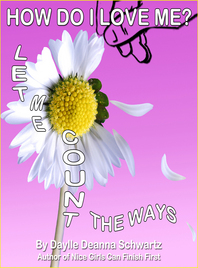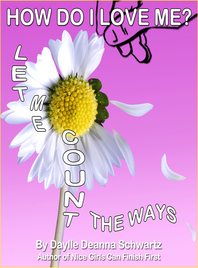 People come to me for counseling, certain that they’re hopeless. No ways can they ever love themselves! I meet people who say they envy that I love myself, since they’re too messed up, damaged, broken, etc. to loved The reasons they believe this vary greatly, but the common ground is that they were made to feel unattractive or dumb or worthless or useless or many other qualities in the past and feel too low to recover. Some examples of what I hear are:
People come to me for counseling, certain that they’re hopeless. No ways can they ever love themselves! I meet people who say they envy that I love myself, since they’re too messed up, damaged, broken, etc. to loved The reasons they believe this vary greatly, but the common ground is that they were made to feel unattractive or dumb or worthless or useless or many other qualities in the past and feel too low to recover. Some examples of what I hear are:
• “I was abused as a child and told it’s all I deserved. I still end up in abusive relationships for some reason.”
• “How can I love my fat body? It’s hopeless!”
• “I do so much to please others and they do nothing in return. If that doesn’t make me good enough to be loved, how can I love me?”
• “My dad said I wasn’t smart enough to amount to anything so why try?”
• I’ve been put down by my family since childhood. It’s too late to change that low opinion I’ve had drummed into my head.”
• “My first real love criticized me non-stop and I can’t let go of feeling I’m not good enough to be loved.”
And much more! No one is born with self-love or a lack of it. You get your cues from the people and circumstances around you that create the way you see and treat yourself. The more you’re put down or made to feel inadequate, the deeper the wounds. Those wounds create habits for how you respond to negative situations, and how you treat yourself:
• When you make a mistake do you beat yourself up or lovingly forgive?
• Do you see yourself through the distorted mirror that magnifies your flaws or rejoice in your good qualities?
• Are you your own worst critic or your best cheerleader?
Obviously the latter answers are the loving ones. Our negative reactions and responses usually occur on auto-pilot as we get older–which become bad habits. A habit is something you do over and over, without thinking. I think of most of what keeps self-love low as bad habits. The good news is that bad habits can be broken, one at a time, and replaced with healthier ones. Rather than a psychological makeover, I prefer to view negative behavior toward self as habits you can break over time. You may be in the habit of always saying yes to others or criticizing anything you do wrong or ignoring your positive assets, or staying with people who treat you poorly since you’re used to them, etc.
Like biting nails or using silly expressions or cracking your knuckles, self-love busters are habits that can be broken.
John Dryden said, “We first make our habits, and then our habits make us.” When you think of your behavior as a series of habits, you can replace those that hurt you with more positive ones. I broke those that reinforced seeing myself in a poor light and treating me worse than I did others. You can too! Start by paying attention to what you think, say or do in different circumstances that reinforce feeling badly about you. Then do what you can to respond a little differently. It might take a long time to break a habit but consistently trying can make the difference.
A good example of this is a great tool I created on my road to self-love. One day I broke a glass that I loved. #%@%&! I got angry and began cursing–at me. I’d been feeling good about myself until then. My awareness was heightened and I heard the idiot, stupid type of words I hurled inward. Stop! It hit me that if a friend did that I’d reassure them that it was okay. Why did I berate myself with nasty words?
It’s easier to be kind and forgiving when others make mistakes than it is to give that consideration to yourself.
In that moment, one of my favorite techniques for self-forgiveness was born. I said out loud: “No, I wasn’t stupid and idiotic for not having a firm grip on my glass. I was silly.” And I smiled. As the words came out, the warmth of self-forgiveness crept over me like a loving blanket. All of a sudden the broken glass lost its importance as being kinder to me took precedence. While this incident didn’t stop my habit of immediately berating myself for a mistake, it did begin a new habit–using gentler words when I did something I didn’t like.
The first few months I’d say the negative word, catch myself, and say, “No, I wasn’t a moron, I was just silly.” Each time I’d do that I’d smile broadly, and still do to this day. Calling myself silly is a great act of self-love. It says I no longer want to judge me in harsh ways and it’s okay to goof up (another kinder word). It’s also instant self-forgiveness. It took me over a year to catch myself faster and problably a few more till it became a solid habit. But the road to this new habit made me smile each time.
Find your own new habits to replace those that aren’t loving.
If someone comments negatively about your body, tell them you’d appreciate their keeping those kind of comments to themselves and affirm to yourself, “I love and accept myself as I am.” Even if they do hurt you, responding from a place of self-love instead of feeling deeply wounded takes some of the sting out of their words. The more you do this, the more it will be your primary reaction to negatives, and the less people will take target practice on you.
Are you in the habit of giving others credit when someone tries to commend you because you were taught that modesty makes you liked more? Practice saying “thank you,” close your mouth, and allow yourself to feel pride. You deserve it! Become vigilant of the things you say or do out of habit that keep you feeling low about yourself. Don’t get angry or disgusted with yourself. We all do things that aren’t in our own best interest because we’re insecure and want people to like us. Pay attention gently, lovingly, without an criticism.
Don’t rush to break lifetime habits. For now, raise your self-awareness.
It took years to get where I am. Start by noticing how you think of yourself in various situations. Are you loving or unforgiving? Do you expect more from you than from others? Identifying habits helps you develop better ones. Developing a new habit of treating yourself more lovingly takes time, patience, desire, and a heightened awareness of habits that bring you down. Love yourself at your own pace.
When you’re ready, you can break old habits and replace them with more self-empowering ones.
Aristotle said, “We are what we repeatedly do.” So we are what we’re in the habit of doing. It doesn’t matter how you treated yourself in the past. That’s over! Today is the first day of the rest of your life. Today is the first day to make a conscious effort to begin your path to self-love by slowly evaluating what you’re in the habit of doing and gently letting go of those that aren’t loving. YOU CAN DO THIS! Don’t rush the process. You have the rest of your life to enjoy the kind of self-love that I’m blessed to have. I want you all to have that blessing!
Self-Love Tip: Pay attention to identify a habit you’re in that hurts your self-love, like always saying yes to requests you don’t want to do or judging yo
Take the self-love challenge and get my book, How Do I Love Me? Let Me Count the Ways for free at http://howdoiloveme.com. And you can post your loving acts HERE to reinforce your intention to love yourself.
Please leave comments under my posts so we can stay connected.

